Retrospecting
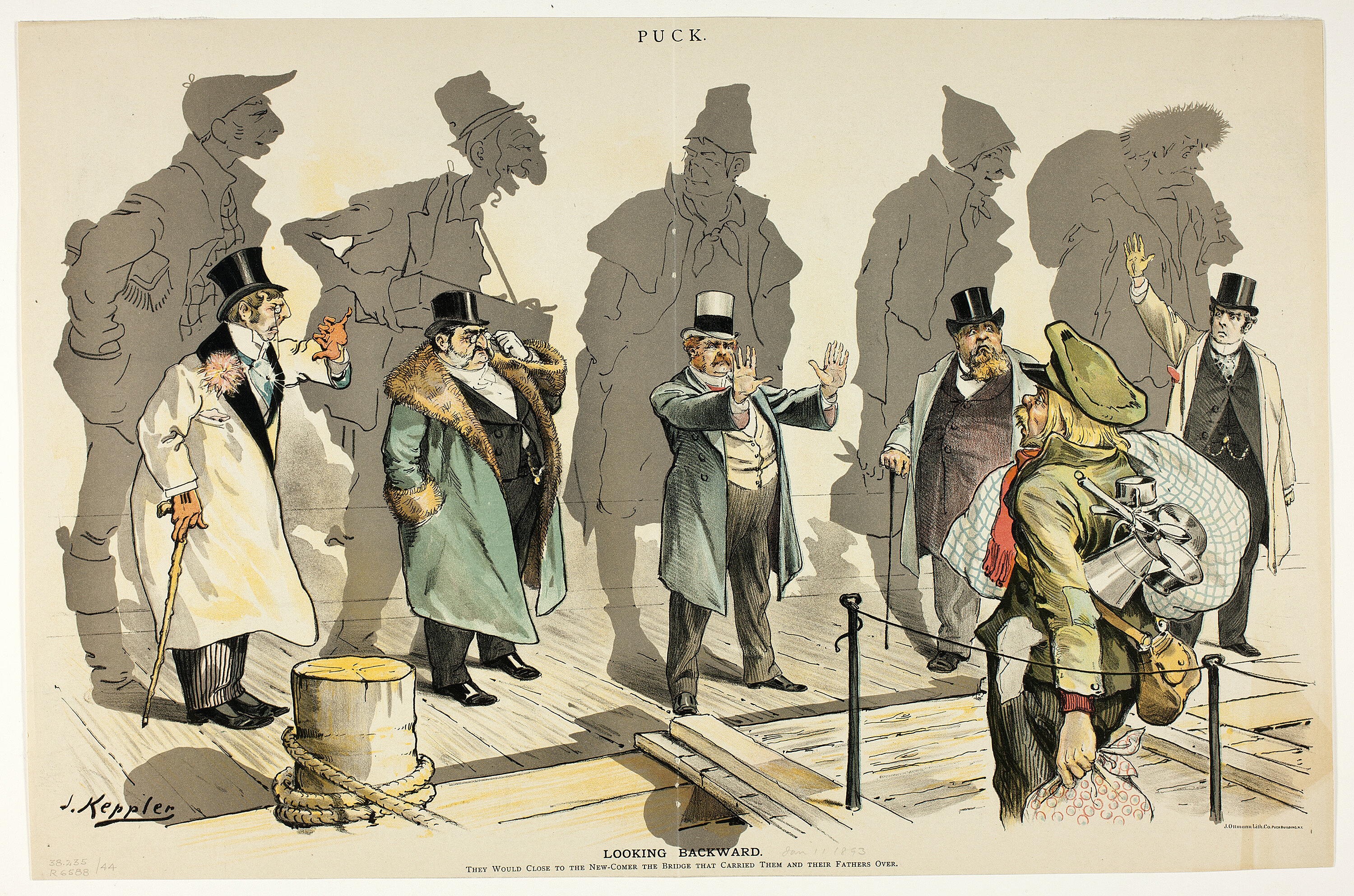
Joseph Keppler: Looking Backward, from Puck (1893)
" ... more infinite and much more significant."
It being New Year's Eve, the last day of this year, I asked myself an innocent question: Have I been successful this year? Innocent or not, this question got me to Retrospecting, reviewing what I'd accomplished, and dreading discovering what I had failed to finish. I could not even remember the names of the four series I'd written through the year; not off the top of my head, I couldn't. I had to look back through the transcripts, the 364 individual installments, to determine what I'd been so focused upon. I spent roughly fifteen hundred hours nurturing my writing habit through the year, yet I could not, near the end of the period, even remember the names of the titles of the four series I'd completed. Have I accomplished anything more than successfully forgetting what I'd created?
I read the first and last installments of each series to get a feeling for what I had been intending and how I'd judged my effort at the moment I completed each.
Career

Cornelis van Poelenburch: The Expulsion from Paradise (after c. 1646)
“Maybe the future will insist that we stay in the garden …”
At nineteen, I was confident about who I wanted to be when I grew up. By the time I hit twenty-five, that certainty had abandoned me as surely as I had abandoned my first and only Career. After that, I wandered this world careerless, without a defined profession, a professional without an explicit portfolio. Had I gone on to pursue a Master's Degree, I might have finally come to adopt a professional identity. Because I hadn't, I became a generalist, a B-school graduate without a specialty. Unsurprisingly, I gravitated toward the work reserved for people like me. I found myself not so much attracted to, but conscripted into the ranks of project workers, matrixed into various roles depending upon the situation, a utility player without a formal position. I later gravitated into project leadership, then project management, but that's no career. It's more of an adjunct association with an organization, existing only for a duration and not forever like a regular role. I became management with a tenaciously small 'm'.
I searched for an association of project people, but when I found it, I refused to join because it didn't seem true to any principle.
SuccessThink

Alexander Voet: The Old Fool and His Cat (17th Century)
"Successful might be the very last thing I ever wanted to become."
Just about the time I graduated from business school, I became interested in how I might become successful. I started frequenting the Self-Help section of Powell's Books and accumulated quite the collection of self-proclaimed helpful titles, among them perhaps the most influential Self Help title ever published, Think and Grow Rich by Napoleon Hill. T&GR was initially published in the late thirties and came with an enviably attractive backstory. According to the author, he'd interviewed Andrew Carnegie, who had confided the secrets behind his success. Hill characterized himself as merely the messenger, a link in a chain stretching back into ancient eternity. He contended that all rich people subscribed to more or less the same guiding philosophy. According to Hill, the difference between them and me was just a difference in outlook. Adopt his book’s philosophy and practices, and wealth would find me. I was skeptical. (Carnegie's estate found no evidence that Hill ever visited.)
I never quite managed to get clear to the end of that book, though it still stands on my shelf.
ExplanatoryStory

Anonymous Germany (Augsburg): The Rich Man
- Scene from the Story of Jehosophat and Barlaam (1476)
"Sometimes it seems like something entirely different."
Martin E. P. Seligmann was a graduate student when he stumbled upon his Success. He was performing experiments with dogs when he noticed that the dogs seemed to become pessimists under certain conditions and started refusing reinforcement. He hypothesized that dogs could learn pessimism. He wondered, if dogs can learn to become pessimists, could they also be taught to be optimistic, and could humans? Thus began his life's work, which so far, at age eighty, has taken him to the top of the Self-Help (a genre he almost personally invented) bestseller lists and to the head of The American Psychological Society. His book, Learned Helplessness, became the basis for the now burgeoning field of Positive Psychology, and spawned a cool half dozen follow-on books which built upon that original base. Learned Helplessness includes a very clever and attractive chart that lists various tactics for countering Learned Helplessness. We've probably all been subjected to some form of these tactics.
When I was a kid, my mother's go-to tactic for countering sadness was to advise her suffering child to "Turn that frown upside down."
FeelingsOf

Jacob Hoolaart, after Adriaen Brouwer:
Man met een geldzak [Man Holding Moneybag] (1723-89)
"I am not at this moment feeling all that successful."
I feel as though I have been dancing around my subject with these first Success Stories. This might be a reasonable if inconvenient time to confess a misgiving I've carried with me since I started writing this series. I admitted then, in my introduction, that I didn't feel as though I knew very much about Success, given that it had been a rare presence in my life. I speak even now of success as if it were a thing, ascribing the infamous 'it' to it, as if it was ever an 'it.' The thing about 'its' is that they are, by international agreement or something, supposed to at least vaguely refer to some person, place, or thing, an entity. Success seems awfully disembodied to qualify for 'itness,' and fitness for itness might matter. Of what do I speak when I attempt to speak of Success?
As near as my beleaguered brain can ascertain, Success might at best (or worst) qualify as a feeling.
TheGames
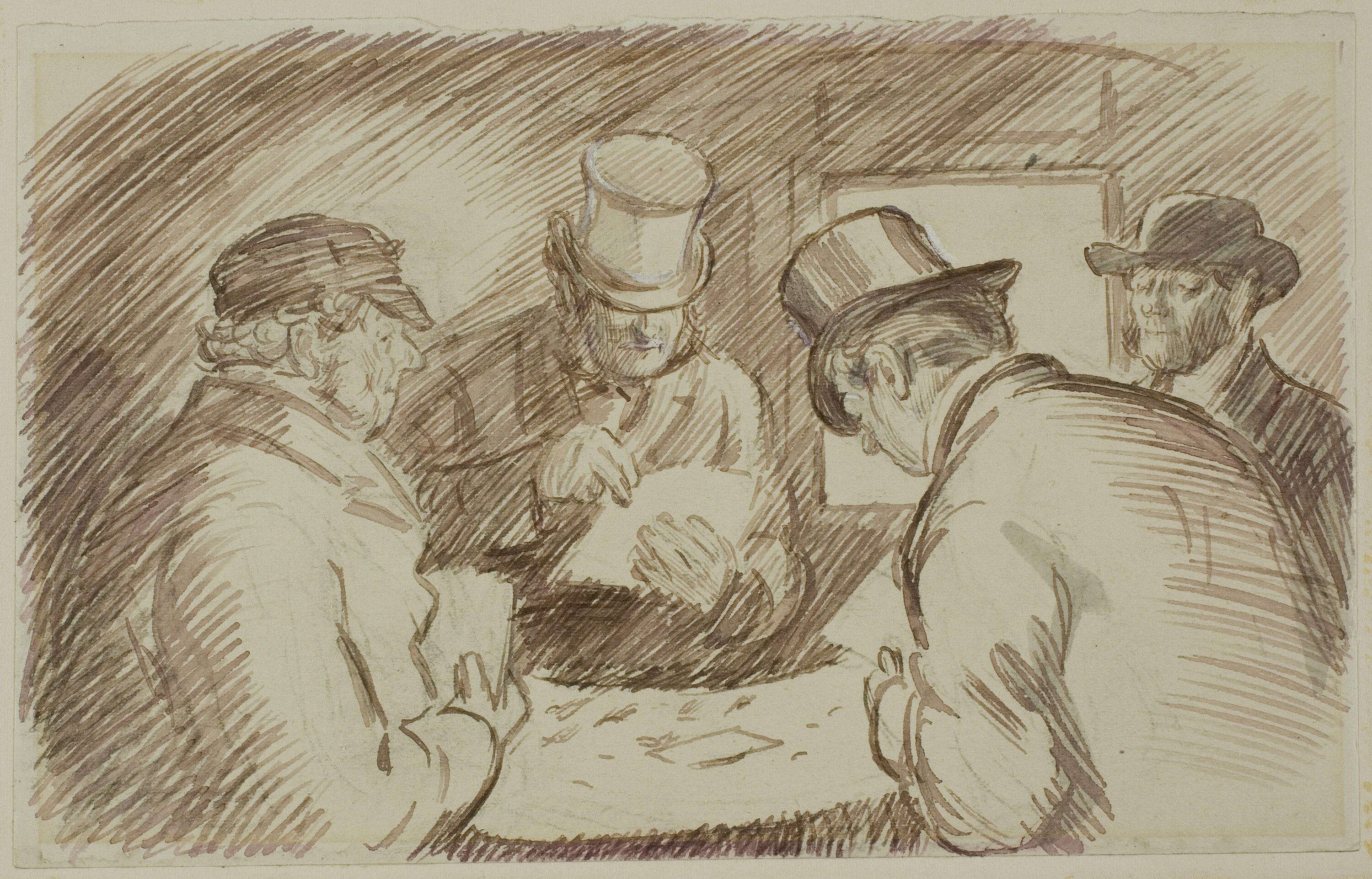
Charles Samuel Keene: A Game of Cards (1870/91)
"Success comes in many colors …"
What are the success games? There seem to be many. Some long, others shorter, some seemingly competitive, others more solitary. Must one master a wide array of games to become consistently successful, or does a niche strategy more likely succeed? Some seem to inhabit a dog-eat-dog world, while others seem to live in almost blissful ignorance of even a hint of competition. Some become team players while others definite solos. I think it unfortunate that in our culture, we imagine so many kinds of engagements to be at root competitions, which, by definition, spawn winners and losers. Many still subscribe to zero-sum perspectives whereby one's success, by definition, dictates another's failure. Some envision a roiling marketplace of Roman gladiator games where it's kill or be killed, without apologies, just the way the game's played, thank you.
Success might involve personal choice more than might seem obvious.
TalkingInto

Jack Gould: Untitled [door to door salesman talking to woman] (1950)
"Success follows many paths home."
My writing work falls into two basic categories: Flow and TalkingInto. The Flow pieces take care of themselves. I start them off, and the writing commences, continuing until they're done. I remain remarkably absent from the process of creating these. They come to me. The TalkingInto pieces remain the rarer of the pair. They come when I'm more self-conscious, often when I feel I have some significant stake in the outcome. They appear when I feel self-important or feel as though I should feel self-important, just as if I have something important to say. My TalkingInto state might be a form of writer's block, an affliction with which I, fortunately, have little personal experience. The TalkingInto pieces become real work before they're finished.
I usually try to flee when discovering I'm engaging with a TalkingInto story.
The Or Deal

Master of the Die:
Venus Ordering Psyche to Sort a Heap of Grain (1530/40)
"My annual ritual amounts to a fool's mission …"
Near the end of each of her weekly examinations as The Muse went through her cancer treatment, Erin, the designated keeper of records for the clinical trial, would ask the same question: "Do you want to continue the trial?" To which The Muse would respond with an enthusiastic, "Absolutely!" This ritual reminded me of one common feature of successful engagements, The Or Deal. The option always exists to abandon almost any activity, though one might not necessarily consider this option in the middle of the typical fray. One gets set into a trajectory, and changing it becomes unthinkable. However, the latitude to turn off the engagement almost always exists and remains at least worth considering. Every effort serves as a kind of dedication test, a check to determine if you retain the stomach for the success and the often previously hidden cost of that success, the ordeal. Either you maintain the stomach to continue, or you don’t; that’s The Or Deal.
Looking back on my now long life, I easily recall a few of the more prominent choice points.
Suckcess
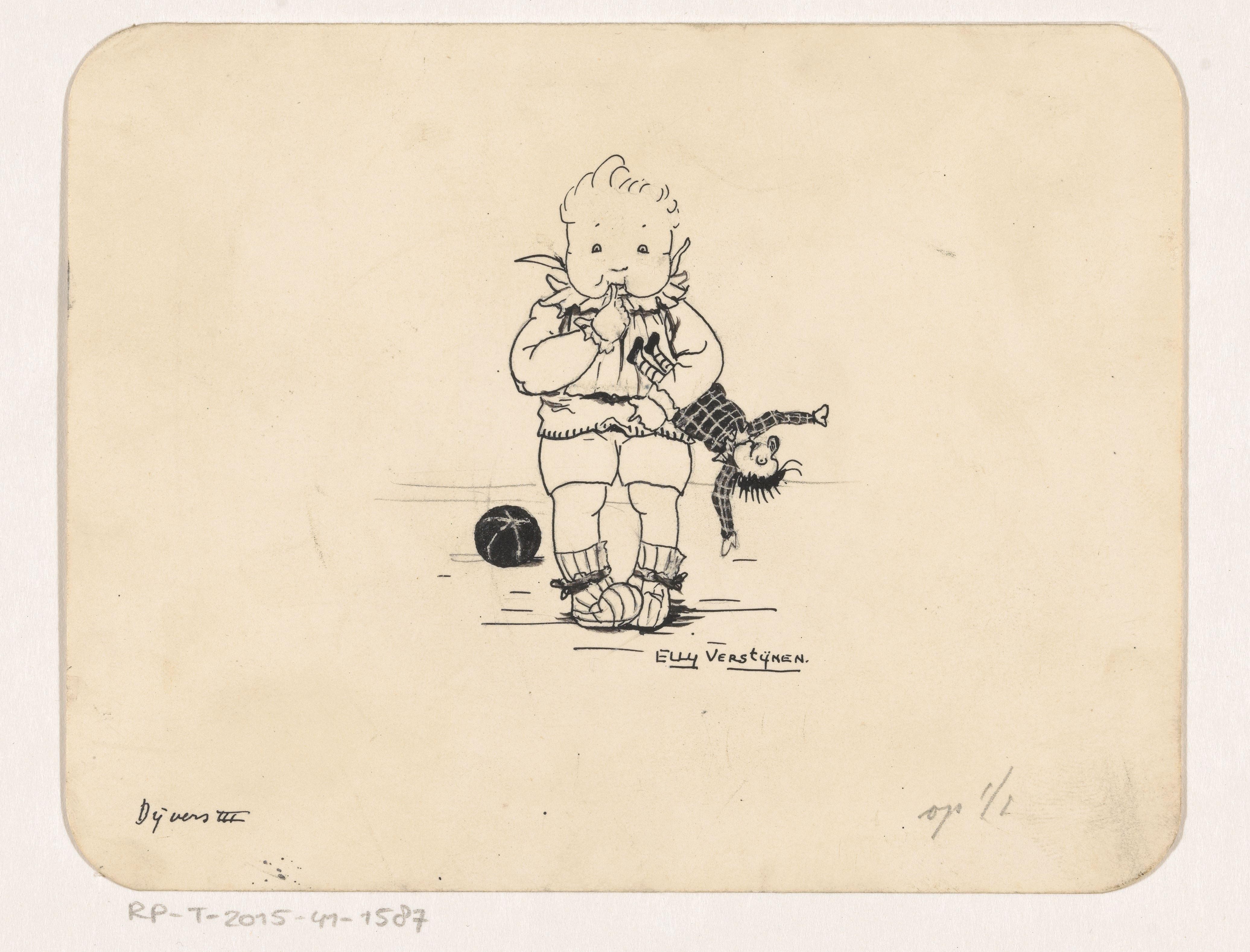
Elly Verstijnen: Jongen met pop [Boy With Doll] (c. 1900-1930)
"No one is ever apathetic except when in pursuit of another's objective."
-Folk Wisdom
"I feel unlikely to ever outgrow my worse bad habits."
So far, the most troubling successes of my life have uniformly been the kind I was supposed to want but didn't. These were often promoted as somehow being for my own good and uniformly seemed more for my certain detriment instead. I'd drag my feet because I could not muster enough motivation to manage any other response. In this way, I laid myself open to various criticisms. If only I could exhibit more discipline. If Onlies then seemed to utterly dominate my foreground. I always thought these experiences exemplified the pursuit of mammon and were trying to tell me to shift my focus from chasing something destined to do me in. This kind of wisdom almost always came later in the game, after investing more than I felt I could afford to lose. Veering off onto another, healthier trajectory always proved difficult to impossible.
It might be true that nobody ever knew what they were supposed to do.
SuccessStory

Thérèse Schwartze: Portrait of Lizzy Ansingh (1902)
" … reframing what success might mean …"
This story marks the first installment of a new series focused upon Success. I feel distinctly unqualified to write this series. This sense alone might qualify me to at least attempt to write it because I hold a growing belief that those who've been held up as examples of success serve as at best poor examples of it. Certainly the richest, often presumed the default most successful, have well proven just how unqualified for emulation they tend to be. Nobody wants to grow up to be Henry Ford or Elon Musk anymore. We pity them their public frailties. Likewise those examples from most any field one cares to name. Each seemed to be poor exemplars on some level. I might well conclude that one of the better ways to elude Success might arise from attempting to emulate anyone touted as successful. This world hardly needs one Elon Musk. Heaven forbid that it had to suffer through two, even if that second one just happened to be you.
I poke at Mr. Musk since he's widely recognized as the world's richest man.
Impossibles

Paul Gauguin: Soyez amoureuses, vous serez heureuses
[Love, and You Will Be Happy], (1899)
"I will not be telling anyone what I didn't intend to tell them again."
By long tradition, the final installment of any story series should at least attempt to summarize, to digest whatever it might have attempted to impart in its prior pieces, to, in the crude vernacular of the professional trainer, "tell them what you told them." There almost always came a time, in my career as a teacher of professional people, when the organizer would start speaking of Training The Trainer. This point signified the impending end of my relationship with that organization and the doom of our inevitably short-lived initiative. Corporations seem to need to frequently change their imperatives, as if to keep fresh whatever impossible they pursue, and they might well be wise to insist upon such shifts, because when dealing with Impossibles, freshness might remain the most important consideration. While it might well be absolutely true that most corporate imperatives represent some sort of impossible intention, one cannot continue perpetually holding the unrequited. It must be "achieved" or abandoned, left without fanfare in favor of some fresh and more enlivening initiative, also inevitably another impossible, eventually facing the same fate.
The Train The Trainer speech gave notice that the client intended to transform their present impossible into standard curriculum, a process which dumbs down its content.
PerfectEnding
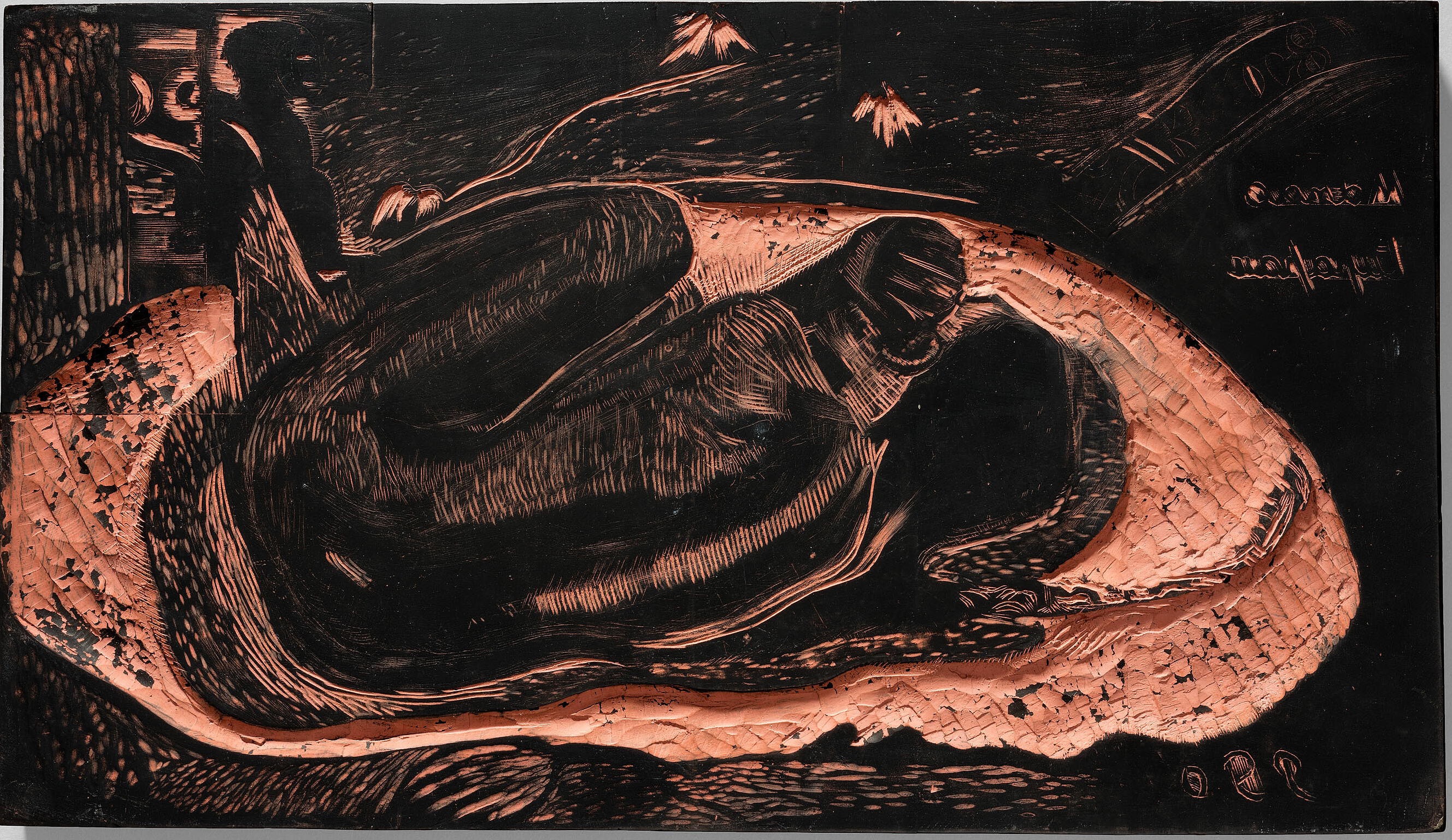
Paul Gauguin: Manao tupapau:
(She Thinks of the Ghost or The Ghost Thinks of Her),
from the Noa Noa Suite (1893/94)
"I'm not quite finished yet."
To speak of a PerfectEnding might be to speak heresy, for the orthodoxy does not usually believe in such things. For them, endings bring opportunities for analysis, for determining what went wrong, to identify root causes, and to inflict judgement, all for the purpose of pursuing the ultimate unachievable objective: continuous improvement. Without such operations, orthodoxies would very quickly go out of business, for without the need for imposing salvation, it's whole operation seems simply fraudulent. If improvement isn't warranted, what's a higher power supposed to do? Could it thrive living in parity with its laity?
In SetTheory, such traditional hierarchies do not hold sway, for they become just another basis for conducting analysis intended to make sense of their presence.
AfterMath

Winslow Homer: After the Hurricane, Bahamas (1899)
"Even happily ever after suggests the storytelling will continue."
After the HouseConcert, what then? What's next? My attention had been so intensely focused through these SetTheory stories that I gave scant concern over what might happen if my dream came true and I somehow, against great odds, managed to perform a set of my songs. Well, the dream came true. The Muse and I stayed up late after the HouseConcert, doing dishes and relishing the receding warmth the evening produced. By the time The Muse went to bed, piles of clean dishes on the kitchen table and my guitar standing in the front window were the only remaining evidence that a gathering had even happened. The following morning, I woke late, feeling deeply satisfied. I had accomplished something.
I had not started studying my curious SetTheory to change the world, for I've always considered notions of changing this world to be sins of self importance.
HouseConcert

Adriaen van Ostade: The Concert (1644)
" … another storybook ending."
As unlikely as it seemed for much of the journey there, the long-touted HouseConcert actually happened. It even arrived a little ahead of the schedule requirement, which I'd imagined to be before I'd reached the end of the current seasonal quarter, before the upcoming Solstice. The right people showed up, too, precisely the proper cast which could not have been improved by the concerted efforts of even an army of over-experienced talent scouts. The light supper was very well received. It just seemed such a freedom to invite folks into The Villa, whatever the pretext. Delivering this SetList of songs seemed an embellishment atop what would have qualified as a very decent holiday gathering regardless.
I'd set the stage, such as it was, along the recently refurbished front window seat, directly in front of the massive front window, which The Muse had decorated with multicolored Christmas lights.
FinishingTouched
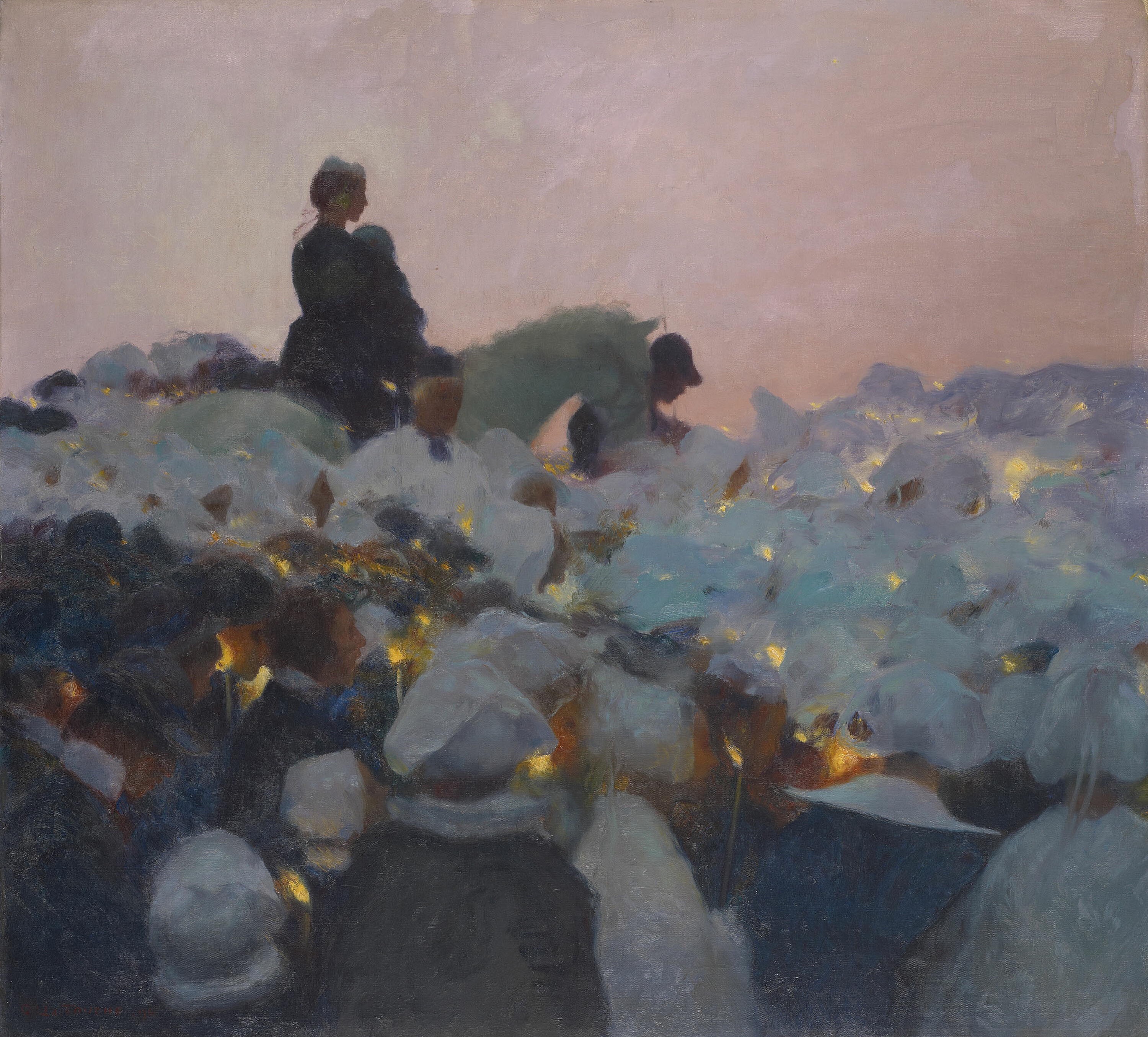
Gaston La Touche: Pardon in Brittany (1896)
A "Pardon" is a Breton form of penitential pilgrimage
conducted at twilight with candles.
"What's inevitably started in innocence
must perhaps necessarily end in gratitude."
Those of us instructed to 'start with the end in mind,' eventually find ourselves going out of our minds since the end always shows up differently than originally imagined. These projections must always originate hopelessly out of that future context, which carries subtleties impossible to imagine beforehand. I suppose this injunction's real intention was never to enable anyone to envision any future, but to serve instead as motivation or inspiration, just to get the imaginer moving toward something, however unlikely that something might be to ever actually manifest. As a result, people often experience endings as bait and switch operations, where what was promised never seems to have been delivered. Success sometimes feels more like a failure.
My almost three month preparation for my house concert carries all the usual vestiges, for it was an initiative no more than normally blessed.
Patter

Albrecht Dürer: The Monstrous Sow of Landser (1496)
"The breathtaking's almost always worth taking the risk."
If my years as a performer taught me anything, they taught me the necessity of Patter and also of the absurdity of preparing Patter beforehand. Proper Patter, my experience taught me, should be impromptu, off the cuff, unscripted. The Patter of which I speak comes before and between the songs, the introductions and reflections that serve as a sort of stage punctuation in the performance conversation. I know that the old vaudeville performers scripted every second of their stage time. Us veterans of coffeehouse stages and small college venues did not, or learned not to. We sought a more authentic presence on stage and did not seriously consider ourselves to be performing, certainly not acting a part, or so we would have insisted at the time. We all were, of course, trying hard to successfully channel whomever we wished to be like, so that we would be liked. Many were bad Dylans. I, myself, leaned more toward the awful Donovan persona, though I was serious about aspiring for authenticity.
What does the term Authentic Performer even mean?
Winnowing
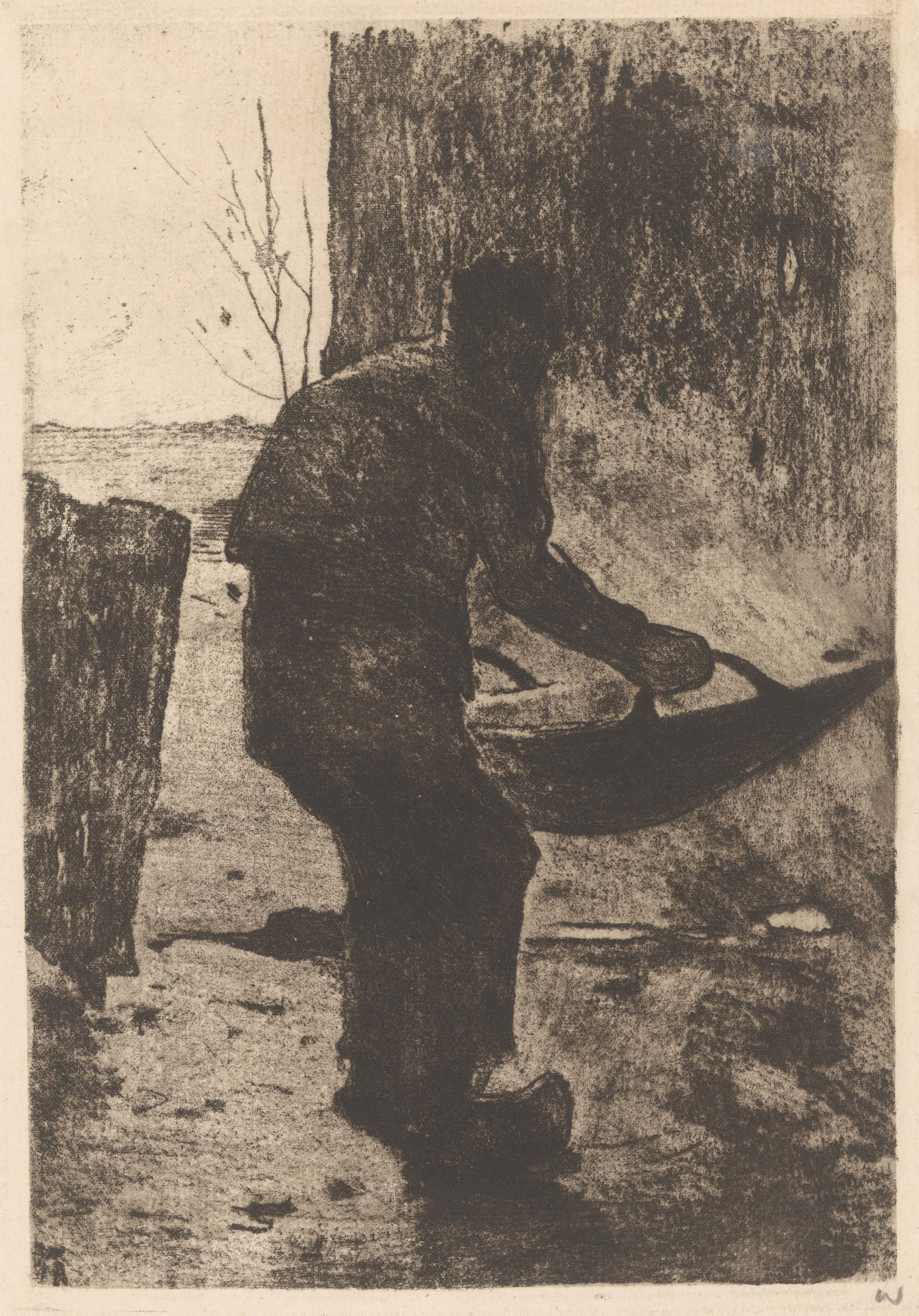
Willem Witsen: Man die aan het wannen is
[Man Winnowing] (c. 1888)
"Winnowing serves as the final embellishment."
Any efficiency expert—probably even any efficiency apprentice—would tell you that this amounts to perhaps the least efficient means to accomplish anything: Over prepare to under deliver, yet this phrase precisely describes the proper method for producing a set of songs. One defers the LifeboatDrill decisions until very nearly the ending, thereby ensuring that more than twice the number of songs actually performed get rehearsed, and not half-assed rehearsed, either. Each must have been considered a genuine contender and even the more difficult ones should have been painstakingly practiced, even unto and beyond great frustration. The list, too, should have properly been re-ordered several times as if the set might last almost ninety minutes, just as if our earnest performer could last a full ninety minutes, which he probably can't.
But performer capability probably sits beside this point.
SittingOnTop

Jacob de Wit, after Peter Paul Rubens:
Oude vrouw met kind en vuurtest
[Old woman with Child and Fire Test] (1734)
"There might not be any better feeling …"
I wrote most of my songs in the Key of D, both because chords in D seemed easier to play and also because its notes fell comfortably within my singing voice's range. I've noticed that many songwriter/performers write exclusively within a single key. Our recently departed and dearly beloved Nanci Griffith also wrote and performed everything in D, so I must be in good company. This choice can produce similar songs, ones only narrowly differentiated from each other, as if every one was the same one all over again, producing a Groundhog Day catalogue like Bruce Springsteen or Tommy James and the Shondells. Fans don't care that they're fed the same supper every night. They are rarely gourmets and, like my cats, tend to reject any supper that's not instantly familiar. Still, the performer might notice and try to stage songs so as to minimize this same-old effect; vary a bit.
The venerable old Key of D no longer proves one my singing range can easily reach.
Convergering
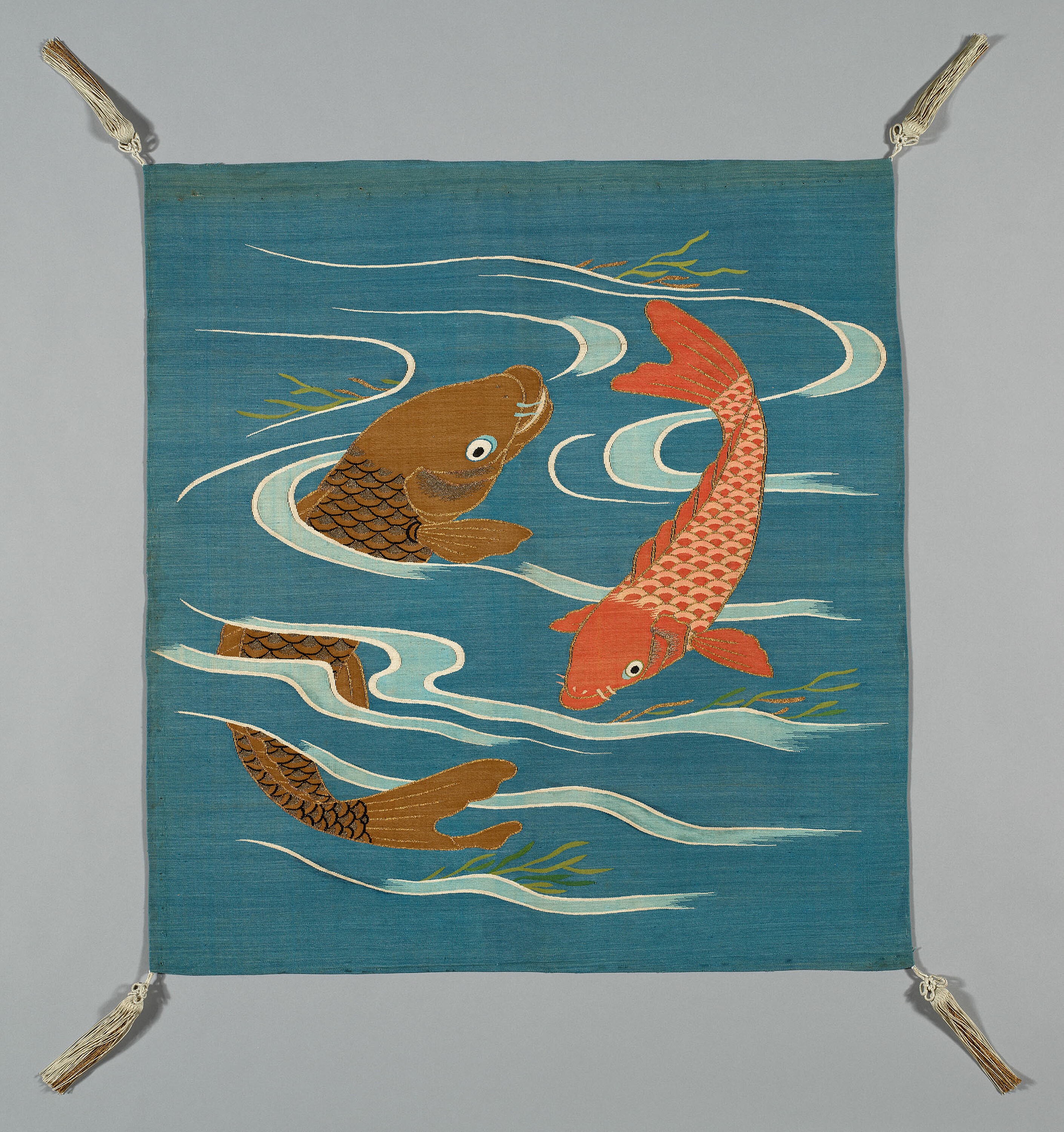
Artist unknown [Japan], Fukusa [Gift Cover] (circa 1801–1900)
" … The Muse departs those premises for good …"
As we pulled The Schooner into the Cancer Center parking lot, the radio started playing Leroy Anderson's arraignment of Sleigh Ride, the only absolutely essential holiday song, complete with wood block hoof pounding, slapstick, and full orchestration. The Muse commenced to shake and jiggle in the seat beside me. I asked what was happening and she replied that she was channeling when she played percussion with the Groton, SD high school band. "I'm shaking sleigh bells," she said, "and whipping the slapstick." Our reverie resolved into tears, and we held hands there while weeping in recognition that this infusion would be the final one in The Muse's months-long sleigh ride through CancerLand.
The oncologist had little more to offer.
LifeboatDrill
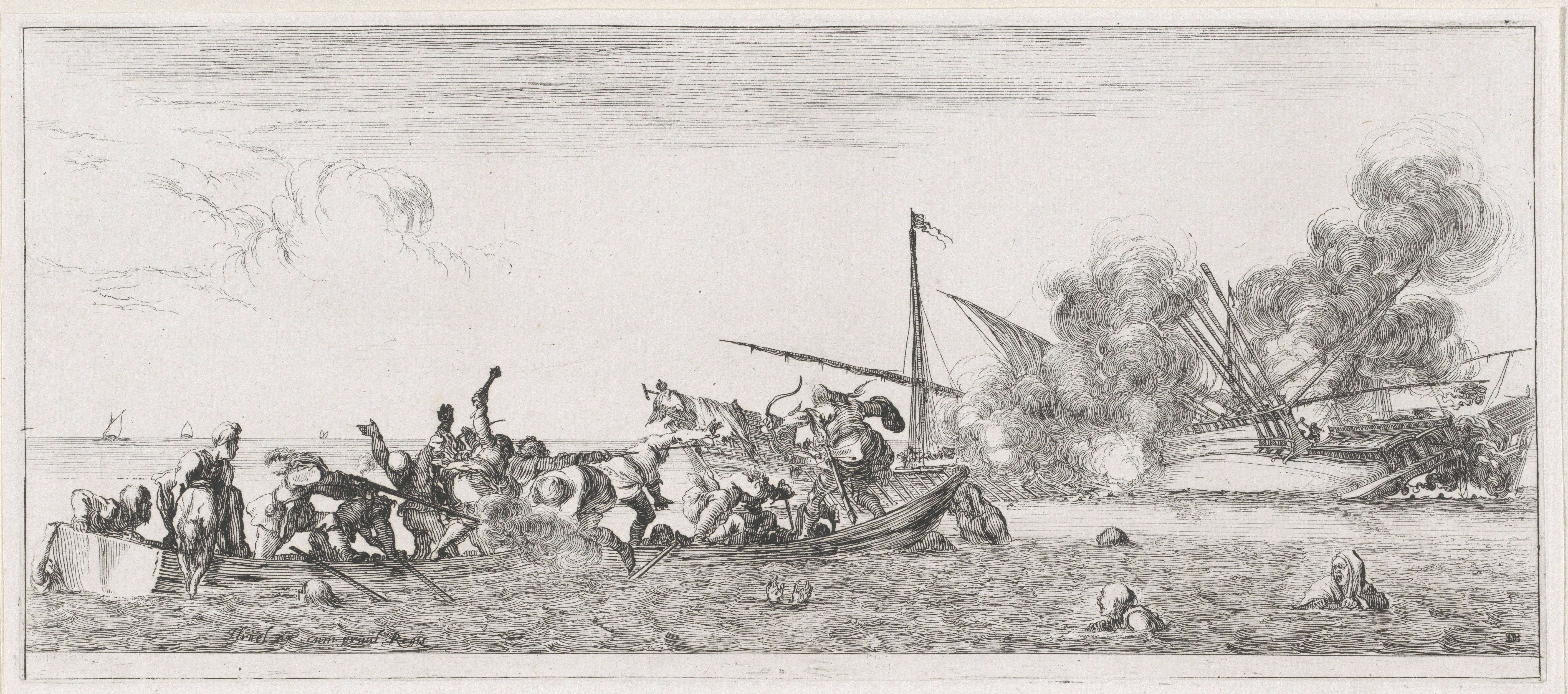
Stefano della Bella:
Mannen in een reddingsboot [Men In Lifeboat]
(Undated- circa 1620-64)
" … nobody intended or wanted to do anyone any damage …"
As consultants, The Muse and I often employed experiential exercises to help our clients gain insights. These amounted to what appeared to be silly little games, though they usually managed to help the client gain traction against some difficulty. We were extremely careful with our game design, though, as we came to understand that these silly little games could leave lasting, even damaging impressions. We always avoided introducing any game which might resemble what we called LifeBoatDrills, those games where a group was forced to choose to vote one or more of its members "off the island," for these can spark real trauma and produce permanent ill feelings, more harm than good. Curiously, this design seems the most common one employed by what has been strangely labeled "reality television," since reality only very rarely if ever actually delivers these sorts of dilemmas. Those who practice LifeBoatDrills probably practice for conditions they will never encounter in the real world or they produce the sorts of experiences nobody ever really wants, probably both. A master of the LifeBoatDrill seems the sorriest master of all.
My long-anticipated house concert, though, seems to have morphed into somewhat of a LifeBoatDrill.
Newing

Paul Gauguin: Jean René Gauguin (1881)
"Not a slave to precedent nor an idiot to improvement."
For me, nothing seems sadder than a tribute band, one dedicated to reliving some heyday on stage. I respect original work, but seeing a late middle-aged troubadour replay their pubescent angst on a stage seems just as sad as Lawrence Welk's orchestra seemed in their later days: dated and then some, unappreciable. Their easy mastery no longer resembles talent or skill, but clearly came as the result of ad nauseam repetition. It was always a wonder that those band members could stay awake through the chorus of most of their tunes because they knew their parts too well to produce a credible performance, which must seem like discovery to really work. They seemed to most need some strategy to just let bygones become bygones. Their performances most reminded their audiences of the absolute the necessity of retirement.
I carry vestiges of these feelings about performing my own compositions, though I have not been vainly repeating the same old songs for generations.
UndressedRehearsals

Unknown Artist, Italian, 17th century:
Juno Commanding Aeolus to Release the Winds (Not dated)
" … all about believing self-deception …"
Practicing slowly morphs into rehearsals as the performance date nears. Practice focused upon bare mechanics while rehearsals include some stagecraft. A performer might scrutinize camera angles, hoping to expose their best profile and, of course, cloak the more unflattering perspectives. Beginnings and endings become more deliberate and the performer actively projects into the ever nearer future. Knowing the performance allows no do-overs, he pushes each tune to conclusion, no longer so quick to stop and repeat a flubbed phrase. He might even gain time consciousness, a terrible addition. What once was timeless becomes time bound as what was once lost slowly gets found again.
The neck of the guitar becomes less restrictive as recent familiarity increases, the product of repetition as well as rediscovery.
SoundCheck

Jacob van der Heyden:
Sound, plate two from The Five Senses
(Not Dated: Artist's working dates 1593–1645)
" … success finally seemed within reasonable reach!"
Sound became the most difficult element of my effort to prepare for my house concert. I'd managed to dredge up lyrics and mostly even found the voice to sing them, transposing one song into a more workable range, but getting the sound through my microphone and guitar pick-up bedeviled me, increasingly frustrating my efforts. The slow realization that the house concert would need to be in part broadcast only increased processed sound's importance. If it wasn't my microphone troubling me, it was my studio headphones. I swear that I will never grow entirely accustomed to trailing cables behind me. They leave me feeling like a prisoner, restricted to only a scant few feet of movement whenever I'm plugged in.
I was on a Zoom® call with my old friend Franklin yesterday and had decided to plug into my sound board to give it a test with a knowledgable listener on the other end.
Sequence
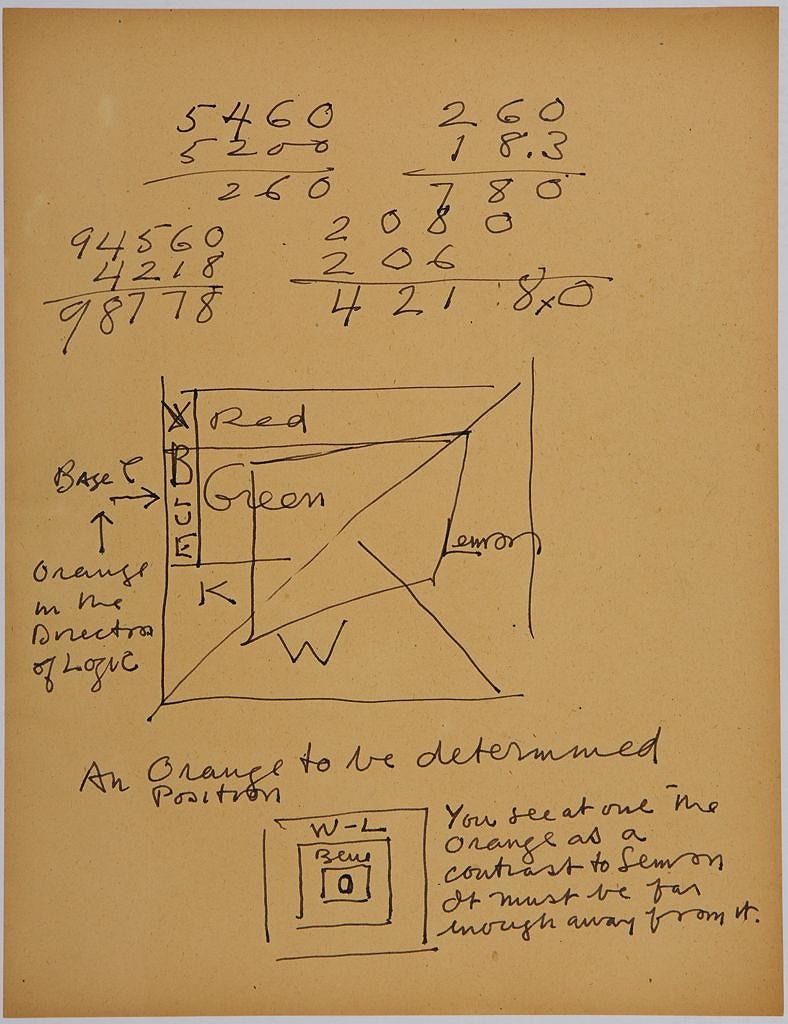
Stuart Davis:
Art Theory Text with Color Sequence Diagram (1951)
"Who's on first? …"
I hold the utterly irrational belief that natural orders exist in both nature and in the works of man, even mine. For instance, I imagine myself ordering the songs in my SetList in such a way as to maximize their impact. I imagine this without for a second having access to what might constitute impact from my perspective or from anyone else's. I might know after I've performed a set, but can only imagine after that natural order beforehand, and even if a song order works, I will have no way of verifying that the order constitutes the natural one or was in any way superior to any other. I must, it seems, create and then manage to believe in a layered fiction which might somehow reinforce itself, bringing resolution. I am today attempting to properly order my SetList songs, a provably impossible undertaking.
Sequence seems like one of those meta conditions not obvious at first glance.
Invitation

Antique Christmas Card
from The New York City Public Library's digital collection
" … who would even agree to attend … ?"
This week, I need to send out the invitations for my SetList performance. I've long planned to deliver this performance in The Villa, with me seated before the grand front window with bookshelves on either side. I've imagined my audience arrayed back into the living room, with perhaps a couple of dozen easily fitting into that space with furniture rearranged and extra chairs. A few might choose to stand. I'd keep the SetList short enough so that nobody would get too fidgety before I finished. We'd drink some wine before and more after as well as enjoy a light mobile supper. It would be a celebration as well as the conclusion of this series, my appreciation for the attention I've received through the lengthy preparation. It would also serve as an introduction of sorts, a first exposure for most present to my semi-secret songwriter background, who I once was as well as who I always was beneath my facade, and who I'll also always thereafter be. I planned it as a curious kind of coming out party.
In the two years and nine months since This Damned Pandemic locked us down, we've rarely hosted any of our usual gatherings.
Seconds
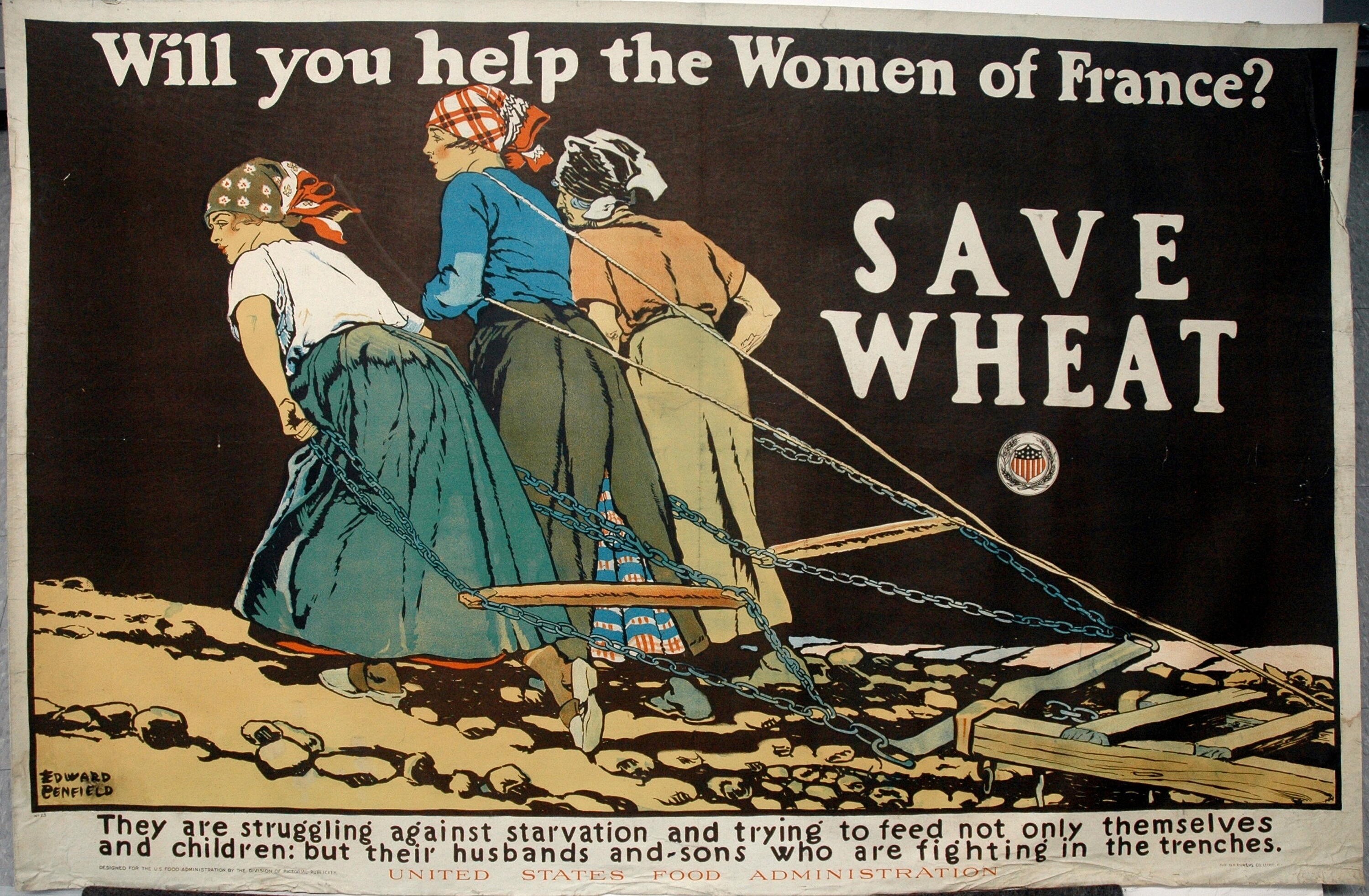
Edward Penfield:
Will You Help the Women of France? (1917)
Printed by W. F. Powers Company Lithographers
published by United States Food Administration
"We're still praying and waiting …"
Ten days after Thanksgiving, Tetrazzini season settles in for a short visit. The turkey's tailpiece remains, the so-called Bishop's Nose, along with an odd wing and a piece of that greasy meat that once covered ribs; little else besides bone. These pieces, proven poor sandwich material, ache to become stock, their last chance to become anything useful on their way out of this world. Half the leftover meat disappeared over Thanksgiving night at the hands of what I suspect to have been a raccoon sauntering through our walk-out refrigerator, also known as the back deck. I'd used Zip-lock® bags to secure the goodies and the raccoon apparently carried a switchblade—we all know they all do— which made short work of my weak defense. The remaining bag contained the more marginal pieces, greasy and barely edible even when amply disguised with The Muse's housemade cranberry sauce, mayonnaise, and thick slices of Swiss cheese. I, too, was aching to render that meat into stock.
The Muse continues recovering from her radiation treatments.
Justifying

Friedrich Amerling: The Young Eastern Woman (1838)
"The cost/benefit analysis of every artistic endeavor,
SetTheory concludes, produces only The Null Set …"
In my apparent insistence to at least attempt to overthink every damned thing I engage in, I stumbled upon the poisonous question: Why? Why seems naked standing alone. It seems to need a question mark attached to its backside, as if to conceal something, and why(?) probably has much to conceal. Its unceasing attempts to justify come as close to original sin as anything anyone could possibly engage in, primarily because it asks a fundamentally unanswerable question. Nothing anyone might muster in response could possibly satisfy it. It sparks excuses, sure, and often long-winded explanations which ultimately fail to explain to anyone's full satisfaction. It amounts to distraction, focusing attention away from essence and toward insistence, like any "good" advertisement attempts. Its likely purpose seems to be to sidetrack focus, to undermine true inevitably unspeakable purpose, and to encourage a commercial mediocrity upon activities which hardly deserve this. As I said above, Why(?) almost always proves poisonous.
In business school I learned how to concoct cost/benefit analysis, this to guide what was labeled decision-making.
ClawingForward
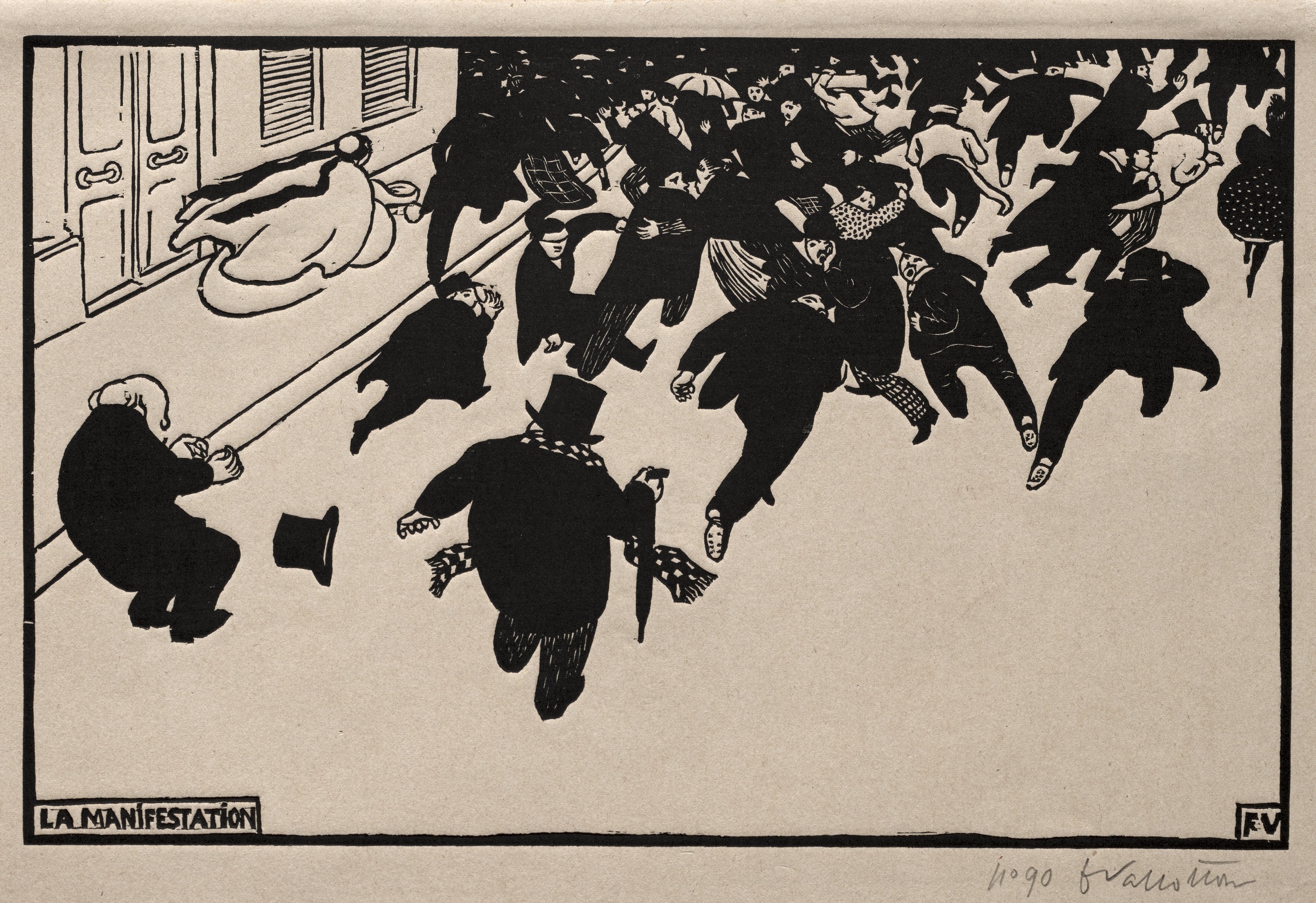
Félix Vallotton: The Protest (1893)
"I try to not make a habit of such behavior."
Each setback provides a fresh premise for ClawingForward, a new dedication test trying to determine the depth of commitment behind the pursuit. I can always forfeit whatever I've already invested and walk away, hoping nobody will notice that I surrendered. Honor, or some emotion very much like it, encourages me to continue anyway, to perhaps even courageously overcome whatever barrier I've encountered. My response more often comes from embarrassment than bravery. I cannot quite face what it might mean if I cannot overcome this encumbrance, so I continue the struggle. I sometimes even succeed, even though trying in no way guarantees any outcome. I fancy myself tenacious when I'm probably just stubborn, but hitting a wall usually incites me into action, and often into investigating some new direction, anything to maintain accustomed momentum.
I read the freaking owner's manual, though the submission was, indeed, painful.
ReSettingBackwards
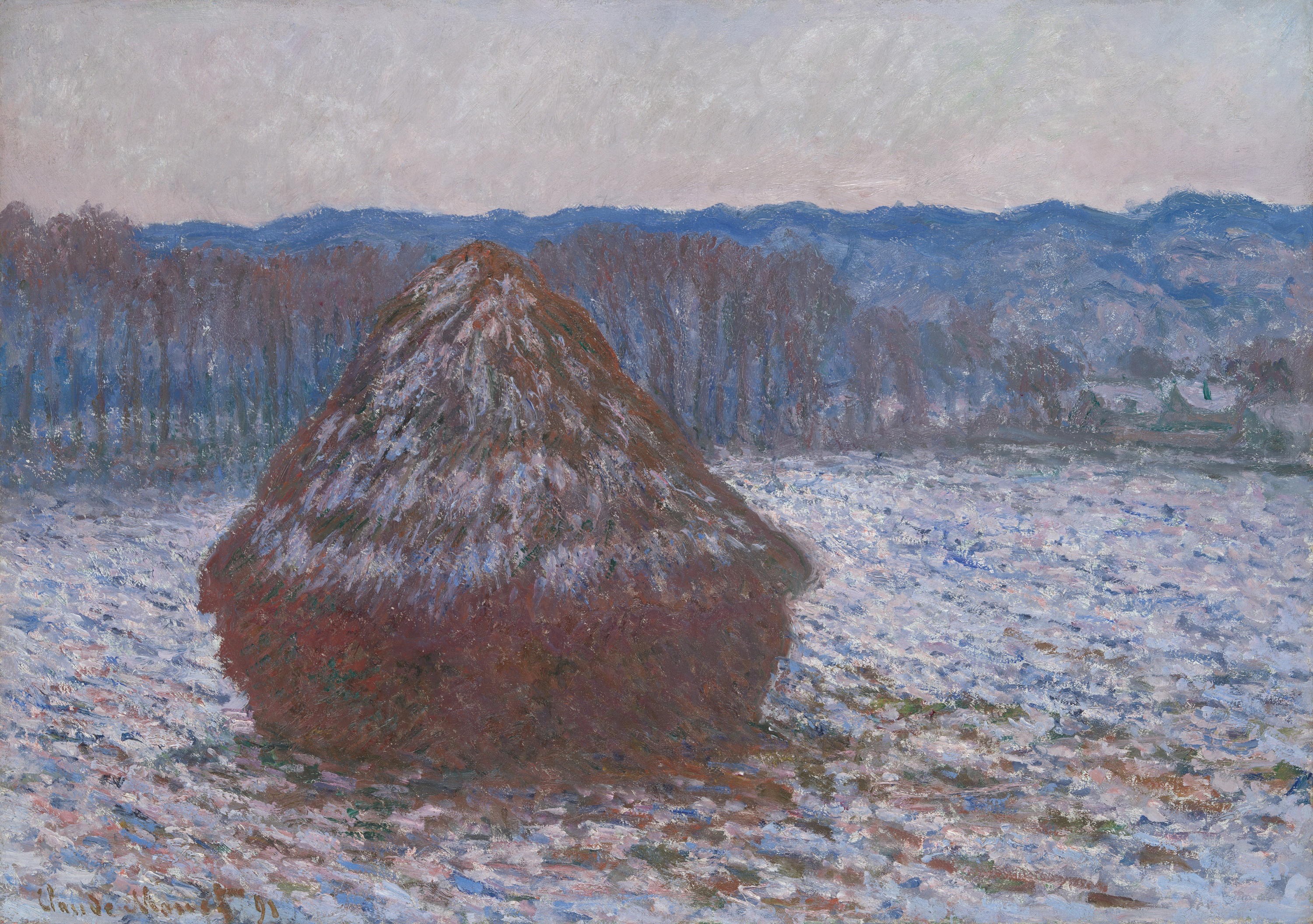
Claude Monet: Stack of Wheat (1890/91)
"Wrong-footed, I sprint for the finish line."
After a week of reporting solid progress, my SetTheory efforts finally hit their wall (again.) The first principle of all forward momentum mentions this wall as a certainty, an inevitability, not a possible encounter but an unavoidable one. This wall generally appears early in an effort, as the usual notional initiation notices that its context differs from what was earlier imagined and planned upon. The experience always feel deflating, as if some cruel mistake had been made against the proceedings. Most efforts manage to recover, albeit almost always on different terms than originally imagined. The possible takes over from the original imaginal intentions and the effort resumes, and often in a different direction. Initial notions of end results almost always amount to fantasies. The quality of leadership usually devolves into the acceptance of some closer semblance of reality over the originally motivating fantasy. The Wall reigns eternal, though. One can choose to go over, around, or through it, but ignoring it never works for long.
Ignoring it almost always seems the preferable alternative when it first appears.
Fining

Hans Weiditz (II) (anonymous:)
Mannen bij een proeverij [Men at a Tasting] (1514-32)
"I paint my face with well-practiced authenticity."
The mirror image of the project-initiating Milling Around Period appears nearer the end of the effort. It amounts to much dusting and polishing, sequencing and clarifying, none of it strictly necessary but all of it nonetheless useful. It might even qualify as meaningless work, but since ninety percent of all work apparently qualifies as meaningless, this classification alone provides no excuse for avoiding engaging in it. Besides, it feels so danged satisfying. Most of the earlier stress and anxiety have by then been leached out. What deadlines remain carry little threat. I feel prepared if not quite prepared enough. I am Fining.
Once a wine or a beer has finished fermenting, it's done for most intents and purposes, save one.
EmotionalSupportAnimal

John Edward Gray:
Dr. Hamilton's Paradoxurus, Paradoxurus Hamiltonii.
From The Living Animal in the Surry Zoological Gardens
(circa 1830-34)
"I find my redemption lurking in the far back corner of my original intention."
The Muse complains when I refer to myself as her Emotional Support Animal. When I asked after her protest, she said that she didn't think of me as an animal. "Am I vegetable, then, or mineral?" She noted that my rock head strongly suggests mineral. My purpose in declaring myself her Emotional Support Animal had more to do with keeping the most serious possible business just as light as possible. My intentions were serious but also bordered upon unspeakable. I wanted to declare that I would be there for her as she went through her cancer treatment, no babying intended. Emotional Support Animals have become troublesome, as many have seized the opportunity to declare their pet as such and thereby gain the privilege of hauling them onto airplanes without paying fares. And it's not just been dogs and cats, but every manner of critter to the point where airlines and the FAA have had to make rules ever stricter. I think it was the alligator or perhaps the ostrich that nudged the practice into untenable territory. Now, one needs evidence that the animal serves as essential emotional support, a level of proof that I suspect should border the impossible to show. Emotional support rarely seems critical.
The Muse probably didn't need the support I offered, but I'd felt it important to offer it nonetheless.


